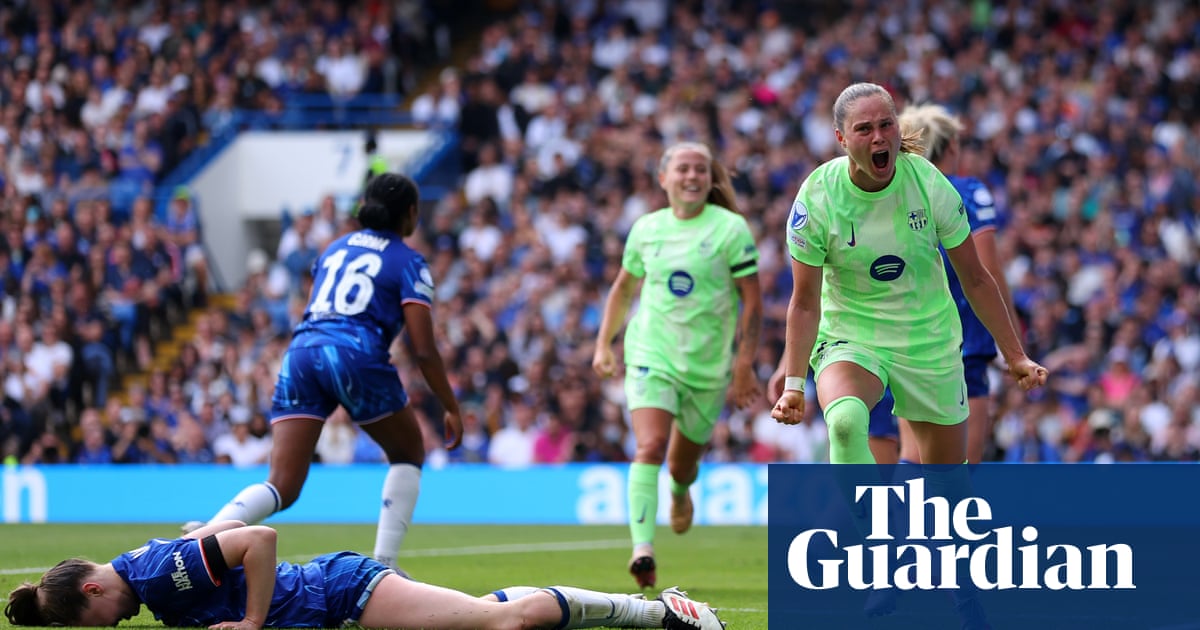Clàudia Pina scores. You know it’s a good goal because the moment it hits the net, Barcelona’s substitutes scramble forward to the front of the dugout, desperate to watch it again on the replay screen. Meanwhile, a few yards away Sonia Bompastor turns to the Chelsea bench and smiles weakly. A yeah-fair-play smile. A what-can-you-do smile.
Pina’s goal makes it 7-1 to Barcelona on aggregate, there are still more than 45 minutes to play, and we have reached the point in thisChampions League semi-finalwhen it almost begins to feel rude that Uefa insisted Barcelona fly over to play this second leg. Imagine the aircraft emissions and single-use plastic glasses that could have been saved simply by abandoning the pretenice that this was a meaningful contest.
But then there are certain pleasures in life that require no justification, and to watch Barcelona in full flow on a gorgeous spring Sunday certainly qualifies. And of course there has always been some maestro quality to this team that allows them to grow in proportion to the occasion, that allows them to flourish at their moment of greatest danger. Give them a stage, give them an elite opponent with a hungry press and something worth winning, and the results are likely to be worth watching.
For Chelsea the one positive thing about a defeat this comprehensive is that there is no need to fixate on the fine margins. No need to complain about the referee or the marginal selection calls or hang individuals out to dry. There were 56,000 runners pounding the streets of London on Sunday and somehow none of them looked as bedraggled at the finish as Chelsea’s players did here. At one point Lucy Bronze had a shot from distance, and Cata Coll simply controlled it with her feet.
The irony is that imperial-phase Barcelona have rarely looked as vulnerable as they have done at times this season. Statistically speaking it’s been their worst campaign since 2018-19, with two defeats in the league and one to Manchester City in the Champions League. Real Madrid can still catch them in the Liga F title race, even if they probably won’t. That’s the problem with establishing a reputation for invincibility: mere dominance feels like a let-down by comparison.
But then there are matches like this, ties like this, when the focus is locked in and the pieces are aligned and Barcelona seem to be playing football in different colours, new colours, colours you can’t even name yet. There is a kind of collective intelligence here that no other women’s team on the planet can currently replicate, the point where pure instinct meets pure identity, individuals empowered to do the exact thing the team requires of them.
Take Pina’s goal, a sweeping length-of-the-field move begun by Pina herself, trapped by four Chelsea players near the corner of her own penalty area. For 99% of the players in world football, the onset of blue shirts is a moment of pure sporting urgency, a time for getting rid. Go long. Swivel and beat a path back to the goalkeeper. Hack it out for a throw. All of these count as decent outcomes.
But of course Barcelona tends to select its roster from the other 1%. And so Pina invites the pressure, waits for the overcommitment, threads a pass to Aitana Bonmatí with the outside of her foot, and all of a sudden Barcelona have a two-on-two break. There is a kind of poetry to the fact that Pina, having hurtled forward in support, is the one who ends up curling in the unstoppable finish from distance. It’s a pure Barcelona goal, the kind that pretty much no other team in Europe is capable of scoring.
Bonmatí’s goal, by contrast, is an entirely different beast. She gets the ball deep in her own half and simply starts running. As she gathers momentum, Chelsea first back off, and then engage too slowly. Niamh Charles puts in a sliding challenge so late it seems to come from an entirely different timeline: a tackle that also serves as its own slow-motion replay.
Sign up toMoving the Goalposts
No topic is too small or too big for us to cover as we deliver a twice-weekly roundup of the wonderful world of women’s football
after newsletter promotion
There is talk, because there is always talk, that Bonmatí is something of an outsider in the Barcelona dressing room, that she occasionally goes missing in games, that she is a systems player with insufficient end product, that the underrated Caroline Graham Hansen might make a more fitting Ballon d’Or candidate this year.
And this is mostly internet nonsense. Bonmatí runs games, she drops deep to receive, her engine is inexhaustible, she gets Barcelona out of tight spots, she gives spice and verve to their attack. But it’s also richly fitting that occasionally she will just run 70 yards out of her own half and smash in a hall-of-fame goal at the near post from a tightening angle. Because the great players don’t simply gild the game. They simplify it.
Naturally there will be talk, because there is always talk, of gaps and gulfs, how they might close and how they might widen. Of where the challenge might come from, of how this dynasty might falter or weaken or somehow be toppled. From a Chelsea perspective there will be angst and soul-searching and very possibly another glut of record spending in the summer.
Football will always be obsessed with the next thing. But empires always crumble in the end; it’s what they do. Perhaps in the next few years Real or Chelsea or Paris Saint-Germain will finally get their act together; perhaps the hunger will wane a little; perhaps injuries and fatigue will bite. The future always comes. In the meantime, this is a team that deserves to be savoured and relished while it still exists.
